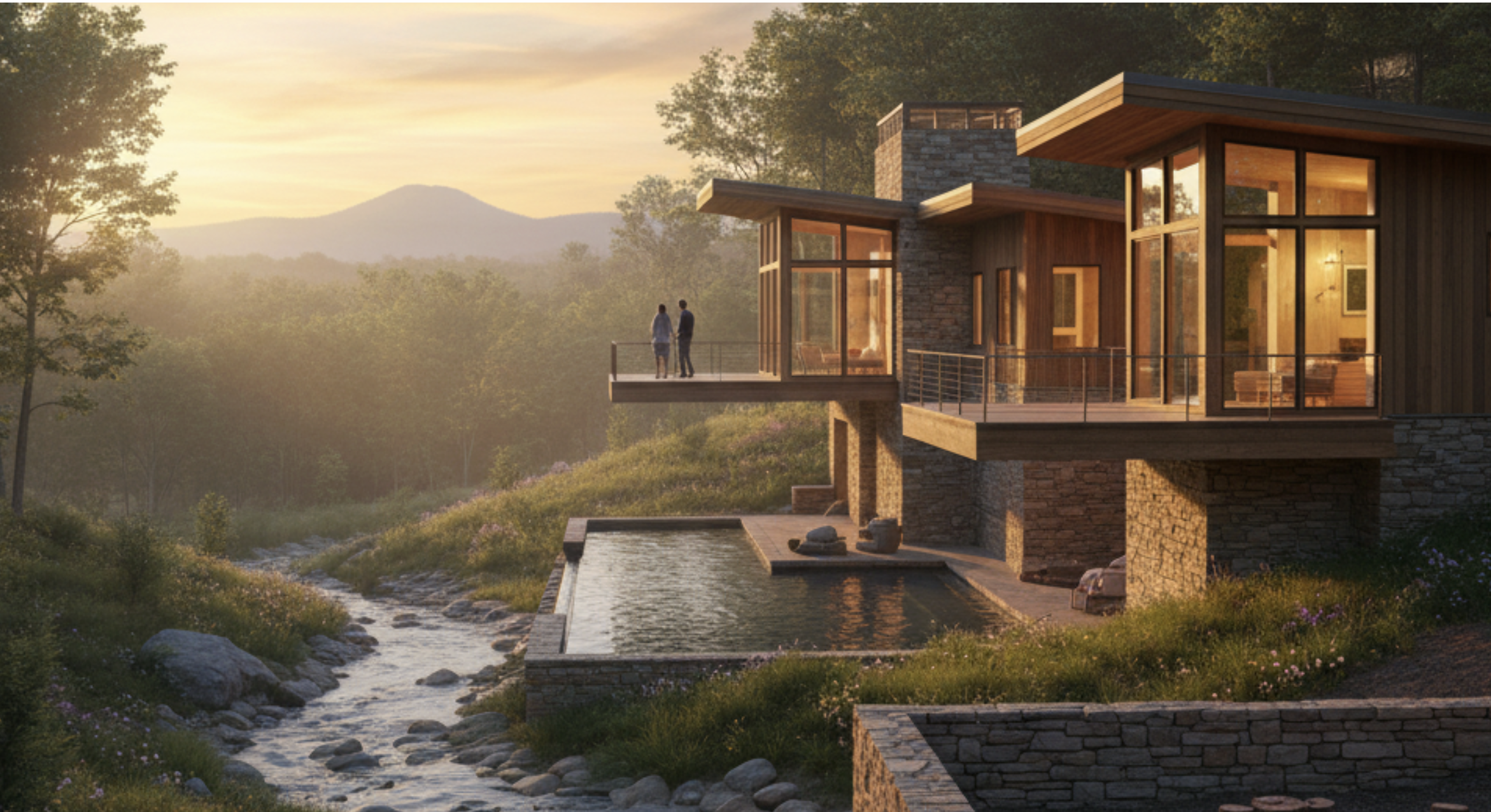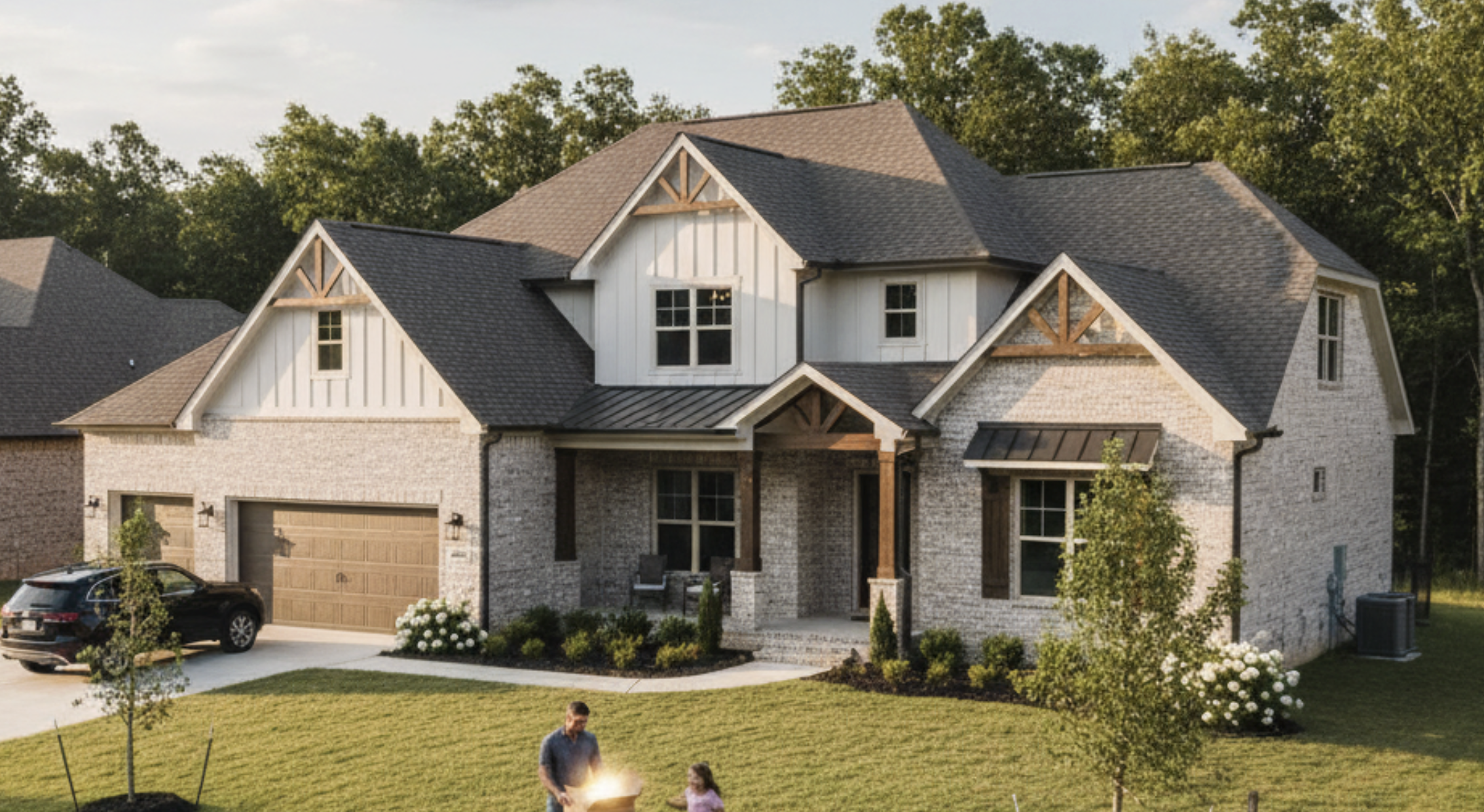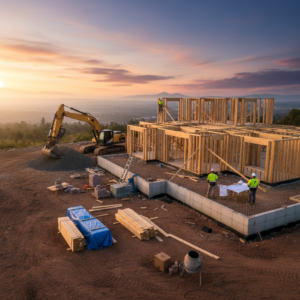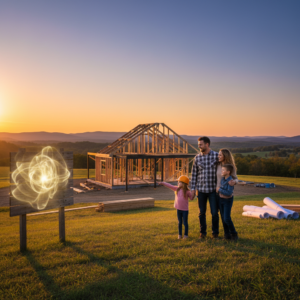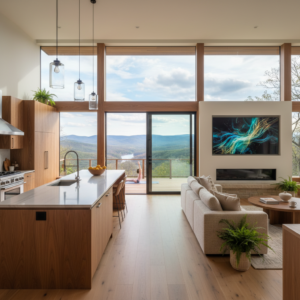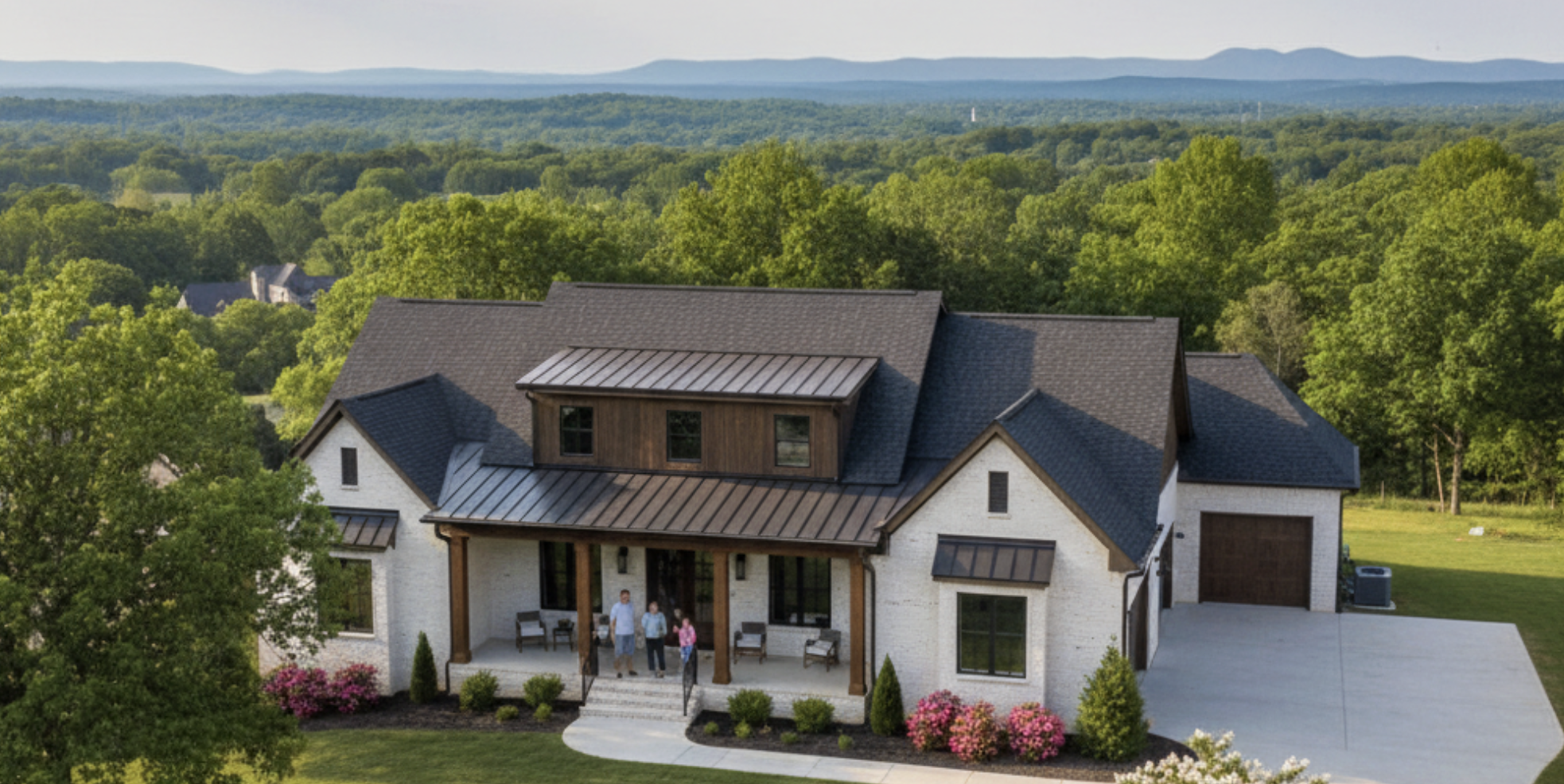
Quick Summary / Key Takeaways
- Little Rock’s suburbs offer diverse appeal for custom builds, from the family-friendly vibe of Benton to the upscale tranquility of Maumelle and the growing communities of Cabot.
- A successful custom home journey in Arkansas starts with meticulous planning, realistic budgeting, and selecting a reputable local builder known for quality and transparency.
- Financing custom construction differs significantly from buying existing homes, often requiring specific construction loans with phased disbursements tied to project milestones.
- Navigating local permits, zoning laws, and HOA regulations is crucial; understanding requirements in areas like Bryant, Conway, or Maumelle saves time and avoids costly delays.
- Personalizing your home provides unmatched value and satisfaction, but effective, consistent communication with your design and build team is paramount to achieving your vision flawlessly.
Introduction
Embarking on the journey of custom home construction is a deeply personal and incredibly rewarding endeavor, especially when you envision it unfolding in the charming and dynamic suburbs of Little Rock, Arkansas. Central Arkansas offers a unique blend of Southern hospitality, natural beauty, and burgeoning communities, making it an ideal canvas for a bespoke residence. Whether you’re drawn to the established elegance of Maumelle, the family-friendly atmosphere of Benton, or the rapid growth of Cabot, the possibilities are as diverse as the landscapes themselves. But let’s be honest: The thought of building from the ground up can feel daunting. I’ve seen firsthand the myriad of questions that arise, from “Where do I even start?” to “How do I ensure that my vision truly comes to life?” It’s not just about bricks and mortar; it’s about translating dreams into blueprints and then into a place you call home. This guide isn’t just a collection of facts; it’s designed to be your trusted companion, drawing on insights from countless builds and the real-world experiences of homeowners and builders in this very region. We’ll demystify the process, illuminate the key decisions, and empower you to build a home that’s not just custom but truly yours in the heart of Arkansas’s thriving suburban landscape.
Key Little Rock Suburbs for Custom Home Builds
| Suburb | Primary Appeal | Avg. Lot Cost (Est.) | Permit Lead Time (Avg.) |
|---|---|---|---|
| Maumelle | Upscale, river views, & golf | $70,000–$150,000+ | 4–6 weeks |
| Benton | Family-friendly, rural charm | $40,000–$80,000 | 3–5 weeks |
| Cabot | Growth, good schools, & value | $30,000–$70,000 | 3–5 weeks |
| Conway | University town, amenities | $50,000–$100,000 | 4–7 weeks |
Custom Home Construction Budget Allocation (Little Rock, AR)
| Cost Category | Typical % of Total | Key Factors Affecting Cost | Potential Savings Tip |
|---|---|---|---|
| Land & Site Prep | 15%–25% | Lot size, topography, & utility access | Choose a flatter lot with existing utilities. |
| Foundation & Framing | 20%–30% | Home size, design complexity, & materials | Optimize the floor plan for structural efficiency. |
| Exterior & Systems | 25%–35% | Roofing, siding, windows, HVAC, & plumbing | Select durable, mid-range finishes and systems. |
| Interior Finishes | 20%–30% | Cabinetry, flooring, fixtures, & paint | Prioritize high-impact areas for luxury touches. |
Application Preparation Checklist
- Solidify your home vision, non-negotiables, and detailed budget before any commitments.
- Secure pre-approval for a construction loan, understanding its unique disbursement schedule.
- Carefully vet and select a reputable custom home builder and architect/designer team.
- Identify and acquire a suitable building lot, confirming zoning and utility accessibility.
Post-Arrival Checklist
- Conduct a meticulous, final walk-through with your builder, compiling a comprehensive punch list.
- Obtain the official Certificate of Occupancy and ensure that all final permits are closed out.
- Set up all the essential utilities (i.e., water, power, gas, and the Internet) and finalize homeowners’ insurance.
- Gather all warranty information, appliance manuals, and critical maintenance documents for your new home.
Table of Contents
Section 1: Why Little Rock Suburbs?
- What are the primary benefits of building a custom home in Little Rock’s suburbs instead of the city?
- Which Little Rock suburbs are best-suited for custom home construction?
- What unique considerations apply to building in a suburban Arkansas setting?
Section 2: Planning & Design
- How do I choose the right custom home builder in the Little Rock area?
- What is the typical custom home design process in Arkansas?
- How important is working with an architect or designer for a custom build?
- What are the common pitfalls in the planning phase, and how can I avoid them?
Section 3: Financing Your Dream Home
- How does financing a custom home differ from buying an existing one?
- What types of construction loans are available for custom builds in Arkansas?
- How should I budget for unexpected costs in a custom home project?
Section 4: The Construction Journey
- What are the typical phases of custom home construction?
- How can I effectively communicate with my builder throughout the project?
- What permits and inspections are required for custom homes in Little Rock suburbs?
Section 5: Post-Construction & Beyond
- What should I do during the final walk-through before taking possession?
- What kind of warranties are standard for new custom homes in Arkansas?
Frequently Asked Questions
Section 1: Why Little Rock Suburbs?
FAQ 1: What are the primary benefits of building a custom home in Little Rock’s suburbs instead of the city?
Building in Little Rock’s suburbs offers advantages like larger lots, a quieter lifestyle, better school districts, and often more flexible zoning for unique home designs. Suburban areas typically provide a stronger sense of community and more green space, enhancing one’s quality of life compared to denser urban environments. You also often get better value for land and can build a larger home for your budget without sacrificing access to city amenities. This balance of space, community, and proximity makes suburbs very appealing for custom builds.
FAQ 2: Which Little Rock suburbs are best-suited for custom home construction?
Maumelle, Benton, Cabot, and Conway are among the top Little Rock suburbs that are well-suited for custom home construction, each offering distinct advantages. Maumelle provides an upscale feel with golf courses and river access, while Benton is known for its family-friendly environment and rural charm. Cabot is experiencing rapid growth with good schools, and Conway offers a vibrant, university-town atmosphere with diverse amenities. Your ideal suburb depends on your lifestyle priorities and budget.
FAQ 3: What unique considerations apply to building in a suburban Arkansas setting?
Building in suburban Arkansas requires unique considerations like specific regional soil types, local utility access, and adherence to potentially more stringent HOA covenants. Understanding flood plain designations, especially near rivers, is crucial, as is preparing for Arkansas’s distinct weather patterns, including humid summers and occasional severe storms. It’s also wise to consider septic vs. sewer systems and well vs. city water, depending on the specific lot chosen. Thorough due diligence on these local factors will prevent unexpected costs and project delays and ensure a smooth build.
Section 2: Planning & Design
FAQ 4: How do I choose the right custom home builder in the Little Rock area?
Choosing the right custom home builder in Little Rock involves thoroughly researching their reputation, reviewing their portfolio, and checking references from their past clients. Look for builders with extensive local experience, clear communication practices, and a transparent contract. Interview multiple builders to assess their compatibility with your vision and ensure that they carry proper licensing and insurance. A strong relationship based on trust is paramount for a smooth building process.
FAQ 5: What is the typical custom home design process in Arkansas?
The typical custom home design process in Arkansas begins with an initial consultation to discuss your vision, budget, and lifestyle needs, followed by a thorough site analysis. Next, preliminary sketches and floor plans are developed, iteratively refined based on your feedback. This progresses to detailed architectural drawings, including structural details and material specifications. These final construction documents are then ready for permitting and building, translating your unique vision into reality.
FAQ 6: How important is working with an architect or designer for a custom build?
Working with an architect or designer is highly important for a custom build, as they translate your vision into functional, aesthetically pleasing, and structurally sound plans. They offer expertise in space utilization, material selection, energy efficiency, and navigating complex building codes, often saving you money in the long run. Their professional insights can elevate your home’s design beyond basic expectations, ensuring a truly unique and personalized outcome. They are the creative minds behind the practical execution, ensuring that every detail aligns.
FAQ 7: What are the common pitfalls in the planning phase, and how can I avoid them?
Common planning pitfalls include an unrealistic budget, vague design specifications, poor site selection, and inadequate contingency funds. To avoid these, start with a detailed financial plan including a 10%–15% contingency, clearly defining needs in writing. Conduct thorough due diligence on your chosen lot’s characteristics before purchase. Engaging a builder and architect early helps identify potential issues before they become costly problems, ensuring a smoother journey.
Section 3: Financing Your Dream Home
FAQ 8: How does financing a custom home differ from buying an existing one?
Financing a custom home typically involves a construction loan, which differs significantly from a traditional mortgage for an existing property. Construction loans are short-term, interest-only loans with funds disbursed in stages as construction milestones are met. These loans often convert into a permanent mortgage upon completion, whereas a traditional mortgage provides a lump sum for an immediate purchase. The custom home financing process requires more scrutiny of plans and builder credentials due to the staged nature.
FAQ 9: What types of construction loans are available for custom builds in Arkansas?
In Arkansas, several types of construction loans are available for custom builds, primarily including construction-to-permanent loans and stand-alone construction loans. Construction-to-permanent loans simplify the process by converting into a standard mortgage upon completion, requiring only one closing. Stand-alone loans, conversely, require a separate permanent mortgage application and closing after construction. Some lenders also offer FHA or VA construction loans for qualified borrowers, providing more flexible terms.
FAQ 10: How should I budget for unexpected costs in a custom home project?
Budgeting for unexpected costs in a custom home project is crucial. A general rule of thumb is to allocate a contingency fund of 10%–15% of your total project cost. These funds are for unforeseen issues like site complications, material price increases, or desired change orders during construction. Having this buffer prevents financial stress and keeps the project on track, reflecting a pragmatic approach to building. My personal philosophy is always to budget more than you think you need, as surprises are inevitable.
Section 4: The Construction Journey
FAQ 11: What are the typical phases of custom home construction?
The typical phases of custom home construction generally include site preparation and foundation work, followed by framing the structure. Next, the exterior shell, including the roofing, windows, and siding, is completed, protecting the interior for rough-ins of electrical, plumbing, and HVAC systems. Finally, interior finishes like drywall, flooring, cabinetry, and fixtures are installed, culminating in landscaping and final touches. The Certificate of Occupancy is issued upon the successful completion of all phases and inspections.
FAQ 12: How can I effectively communicate with my builder throughout the project?
Effectively communicating with your builder requires establishing clear expectations for updates, scheduling regular site meetings, and utilizing a centralized communication method. Document all decisions, changes, and agreements in writing to avoid misunderstandings and address concerns promptly and respectfully. Fostering an open, collaborative relationship from the outset will ensure that your vision is realized and any issues are resolved efficiently. This partnership approach guarantees the best outcome for your custom home.
FAQ 13: What permits and inspections are required for custom homes in Little Rock suburbs?
Custom homes in Little Rock suburbs require various permits, including building permits, electrical, plumbing, and mechanical permits. Additionally, specific zoning or environmental permits may be necessary depending on the lot. Each construction phase necessitates inspections by local authorities—such as foundation, framing, and final inspections—to ensure compliance with building codes and safety standards. Always confirm specific requirements with your local planning department and builder, as they vary by municipality.
Section 5: Post-Construction & Beyond
FAQ 14: What should I do during the final walk-through before taking possession?
During the final walk-through, meticulously inspect every room, testing all appliances, fixtures, and systems, and noting any imperfections or incomplete items on a “punch list.” Bring a detailed checklist, mark any scratches, dings, or operational issues, and ensure that all agreed-upon finishes and features are present and functioning correctly. This is your last chance to identify any issues before full possession, so be thorough and don’t rush the process. A good builder will walk you through patiently, addressing your concerns.
FAQ 15: What kind of warranties are standard for new custom homes in Arkansas?
Standard warranties for new custom homes in Arkansas typically include a one-year warranty on workmanship and materials, a two-year warranty on plumbing, electrical, and HVAC distribution systems, and a ten-year structural warranty. These warranties protect against defects in construction and major structural components, providing homeowners with significant peace of mind. Always review the specific terms and conditions of your builder’s warranty documents carefully. Coverage can vary slightly between companies, so understanding your document is essential.
Article Summary
Dreaming of a custom home in Little Rock’s vibrant suburbs? Discover expert insights on planning, financing, and building your ideal Arkansas residence from Silver Fields Construction. Get started today!
